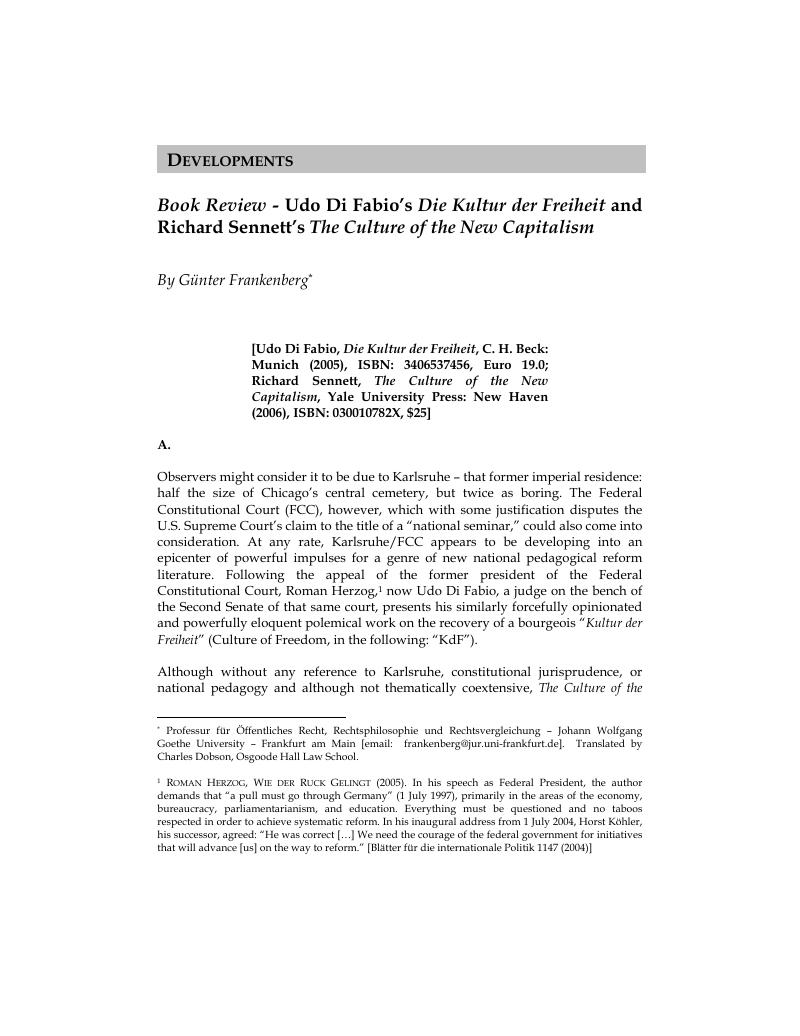Published online by Cambridge University Press: 06 March 2019

1 Roman Herzog, Wie der Ruck Gelingt (2005). In his speech as Federal President, the author demands that “a pull must go through Germany” (1 July 1997), primarily in the areas of the economy, bureaucracy, parliamentarianism, and education. Everything must be questioned and no taboos respected in order to achieve systematic reform. In his inaugural address from 1 July 2004, Horst Köhler, his successor, agreed: “He was correct […] We need the courage of the federal government for initiatives that will advance [us] on the way to reform.” [Blätter für die internationale Politik 1147 (2004)]Google Scholar
2 A term leading back to Zygmunt Baumann, Liquid Modernity (2003).Google Scholar
3 See Richard Sennett, The Corrosion of Character (1998) for a detailed discussion.Google Scholar
4 See Margaret Mahler, The Psychological Birth of the Human Infant (1975) for details on this concept.Google Scholar
5 “In his highly regarded work The Fall of Public Man, Sennett, as one of many, portrayed the family as threatening and sense destroying intimacy: a social prison with never-ending squabbles, daily worries over unpaid bills, perpetual pressure to have to chauffeur children from here to there.” Udo Di Fabio, Die Kultur Der Freiheit 32 (2005)Google Scholar
6 He follows the system theory in the world differential system, but contests their autopoesis. Orthodox followers of Luhmann would castigate him as a renegade.Google Scholar
7 In earlier works Di Fabio prepares his views on values. See in particular: Udo Di Fabio, Die Grundrechte als Wertordnung, 59 Juristenzeitung 1 (2004).Google Scholar
8 Reference to vitality in Die Kultur der Freiheit is not a novelty: see already Udo Di Fabio, Die Schutz von Ehe und Familie - Verfassungsentscheidungen für die vitale Gesellschaft, 56 Neue Juristische Wochenschrift 993 (2003).Google Scholar
9 Richard Sennett, Verfall Und Ende Des Öffentlichen Lebens 13 (2002) [The Fall of Public Man (1977); Udo Di Fabio, Die Kultur Der Freiheit 32 (2005).Google Scholar
10 From the comprehensive literature: Ulrich Rödel/Günter Frankenberg/Helmut Dubiel, Die Demokratische Frage (1989); John Keane, Civil Society: Old Images, New Visions (1998); Jeffrey Alexander, Real Civil Society: Dilemmas Of Institutionalization (1998); Arnd Bauerkämper, Die Praxis Der Zivilgesellschaft (2003); Ansgar Klein, Der Diskurs Der Zivilgesellschaft (2001); Helmut Anheier Et Al., Global Civil Society 2001 (2001).Google Scholar
11 See BVerfGE 103, 242, 267.Google Scholar
12 Similarly in his review, the enthusiastic Jörg Lau, Experimenteller Konservatismus, 682 Merkur 66, 68 (2006).Google Scholar
13 At any rate, perhaps ironically, Di Fabio sees what ‘undermines’ the justifications of democracy: “Citizens lose their waypoints for making their own judgments when they can no longer judge political questions in the reference framework of their own historically developed and public culture with its deep layers of legends, sagas, and fairy tales, its collective experiences, its proverbs, its rules of wisdom, and the spirit of their own language with its complex references, connotations, and evidence”: Udo Di Fabio, Die Kultur Der Freiheit 54 (2005).Google Scholar
14 See Behrens, Roger, Der Positivismus entdeckt das Erlebnis, KRISIS 21/22 (2005), his recension on Sennett, The Corrosion of Character (1998).Google Scholar
15 Besides Sennett's Corrosion of Character, his Respect: The Welfare State, Inequality, and the City (2003) needs particular mentioning.Google Scholar
16 Who, with his - though selective - receptive and value-based system theory from Adorno (footnote 1) to the Maastricht Treaty (footnote 205), from Arnold Gehlen to Giovanni Pico della Mirandola, develops a colorful world of citations.Google Scholar
17 “New strength arises when people stop regarding economic, cultural, and political occurrences as spectators and instead ask how one can do things better and, above all, what one can do personally”: KdF 276 (2005).Google Scholar
18 Examples from the voluminous literature: Bundesministerium Für Familie, Senioren, Frauen Und Jugend (Hg.), Gemeinsam Gegen Häusliche Gewalt (2004); Bundesministerium Für Familie, Senioren, Frauen Und Jugend (Hg.), Lebenssituation, Sicherheit Und Gesundheit Von Frauen In Deutschland (2004); Luedke/Lamnek, Schläge In Jeder Dritten Familie (2002); Habermehl, Gewalt In Der Familie (1989).Google Scholar